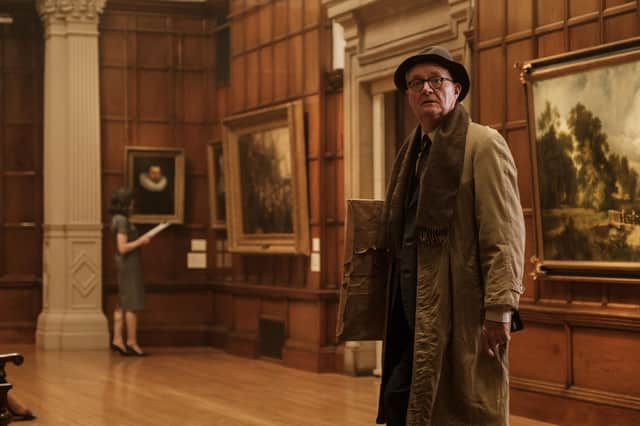Jim Broadbent on art heists, the BBC and his friend Roger Michell


It remains the only time a picture has been stolen from the world-famous art museum in its long and storied history.
So goes the story of The Duke, a truth-is-stranger-than-fiction story about a working-class hero, Kempton Bunton, played by Jim Broadbent, who is intent on fighting for the rights of the common man, including free TV licences for OAPs.
Advertisement
Hide Ad“You wouldn’t be able to sell it as a fiction – if you said ‘I’ve written this story’, no-one would believe it. It’s gloriously unbelievable, the whole thing,” marvels 72-year-old Oscar winner Broadbent, whose long and varied career has included family favourites such as Harry Potter and Paddington, Mike Leigh dramas such as Topsy-Turvy and Another Year, and prestige films such as Iris and The Iron Lady.
“It was a beautifully written script with this incredible tale, and a fantastic character – the most exciting character I’ve ever been offered… It was so irresistible and I just adored it and him from the word go, every aspect of it.
“It’s a character I identified with, and thought ‘I’d love to play this man in this story, let’s try and make it as good as possible.’ And it was a delight in every way.”
Broadbent certainly looks as though he’s having a good time in the film, enjoying the kind of heist high jinks that are normally reserved for actors half his age, but it was the scenes of Kempton’s domestic life, with his wife, played by Dame Helen Mirren, and his son, played by Fionn Whitehead, that moved him the most.
“I think the writers said they started off writing it much more as a heist movie, with that being the centre of the story, but actually then it became more about the people and the family, and that’s what makes it strong, those relationships, as it all unfolds.
“I love those family scenes. I loved making them and I love seeing them on the screen. They’re delightful and that’s what families are like – the in-jokes and the bickering and the banter and the love that is purely on display and the neediness of them all.”
Advertisement
Hide AdKempton hid the painting in a wardrobe at his house and sent ransom notes saying he would return the painting on condition that the government invested more in care for the elderly.
He had long been a passionate campaigner for free TV for pensioners and the film shows in amusing detail his bid to remove the tuner from the back of the television which allows it to receive the BBC, so he can avoid paying the licence fee.
Advertisement
Hide AdWhen a TV licence inspector comes to call, he claims he has no need to pay the fee as he physically cannot watch the BBC and tips off a reporter from the local newspaper, who arrives in time to capture Kempton’s protest, with his hand-painted placard bearing the slogan “Free TV for the OAP” handily positioned in the background.
The film might be set 60 years ago, but it’s not lost on Broadbent that Kempton’s campaign is still relevant today. While free television licences for pensioners were eventually introduced in 2000 for the over-75s, the universal benefit was recently scrapped, and now only those on Pension Credit are eligible.
Just this month Culture Secretary Nadine Dorries announced that the fee, which funds the BBC and its output, will be frozen for the next two years and a new funding model will be sought.
“It’s interesting, isn’t it, that the BBC is under threat from the Government?” Broadbent says. “And I’m sure that Kempton would have been fighting to defend the BBC.
“He would be obviously be wanting free TV for the OAPs but at the same time defending the right of the BBC to present what they what they do and fighting against the Establishment, who seem to be trying to dismantle the BBC one way or another, which he would be appalled at, ironically.”
Broadbent too is concerned about the future safety of the BBC. “It’s vital that we have what we have and it doesn’t get diminished,” he says.
Advertisement
Hide AdHe is also anguished that this film, which he feels so warmly about, and which is so filled with humanity, was the last made by his friend, director Roger Michell, who died last September at the age of 65.
The film-maker, who directed movies including Notting Hill, Everlasting Love, Venus and My Cousin Rachel, and was resident director at the Royal Shakespeare Company for six years, was beloved by Broadbent, and the actor is still reeling.
Advertisement
Hide Ad“It’s painful,” he admits. “Everyone who worked with Roger – actors, writers, in theatre, film, behind the camera, behind the set – everyone wanted to work with him again.”
But he takes pleasure in the fact that he leaves behind The Duke, and this tribute to the indomitable spirit of Kempton Bunton.
“There is a massive loss right across the business,” Broadbent reflects, “but at least we can celebrate his film-making.”
The Duke is in UK cinemas from today
Comments
Want to join the conversation? Please or to comment on this article.